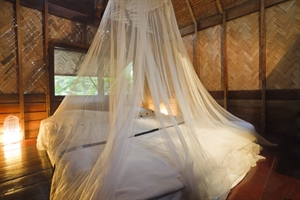Malaria kills a child every minute according to the World Health Organization, so recent news stories about a vaccine for this mosquito-borne disease are certainly a cause for celebration. But is this malaria vaccine available to travellers from Canada?
Is there a malaria vaccine for travellers?
There are several malaria vaccines available – one is Mosquirix, which the World Health Organization has approved; and another promising malaria shot from Oxford University, known as R21/Matrix-M. At present, malaria vaccines are not being recommended for travellers, with doses being prioritized for the 25 million children living under threat of this dangerous tropical disease.
What is malaria?
Malaria is a feverish illness that is sometimes fatal in travellers. It is caused by an infection with a parasite that is carried by mosquitoes. Malaria can make you ill enough to spoil your trip abroad, and it takes a while to recover from malaria so you may have to miss work on your return.
Learn more about malaria with Canadian Travel Clinics.
How can I protect myself from malaria?
For travellers, there is a four-step approach to avoiding malaria, known as the malaria ABCD.
A is for awareness of the risk of malaria
Know about malaria before you go by making a travel health appointment six to eight weeks before departure. A travel health nurse can give you reliable information about the malaria risk in the region you are visiting, taking into account your own individual health needs.
B is for bite prevention
Practise mosquito avoidance to reduce exposure to the parasite that causes malaria. Avoiding mosquito bites also reduces your exposure to other insect-borne diseases like yellow fever. At your travel health appointment the nurse or pharmacist will give you the latest science-based advice on avoiding mosquito and insect bites.
C is chemoprophylaxis to protect against malaria
It may not be possible to completely avoid getting bitten by mosquitoes, but there are meds you can take, in form of pills, that disrupt the lifecycle of the malaria parasite.
Some antimalarials are available over the counter, but not all antimalarials are suitable for everyone and for every destination. You’ll need to start your malaria pills before you arrive in the area where malaria occurs and complete the course after you leave. Your travel health nurse can advise on the most appropriate type of antimalarial for you and your trip, and help you work out when to start and stop taking them.
D is for diagnosis
Antimalarials combined with mosquito bite avoidance offer good protection against malaria; but you are still at risk from it, even after taking these precautions. Malaria can be treated, but it’s important to get it diagnosed quickly. Treat any feverish illness that you get while travelling in the tropics, and for 30 days after your return, with caution. Seek medical advice and mention your travel history. This will ensure a prompt diagnosis and the most effective treatment.
Where can I learn more about the malaria vaccine?
CBC news story: New malaria vaccine shows strong protection in global fight against deadly disease
World Health Organization news story: WHO recommends groundbreaking malaria vaccine for children at risk

